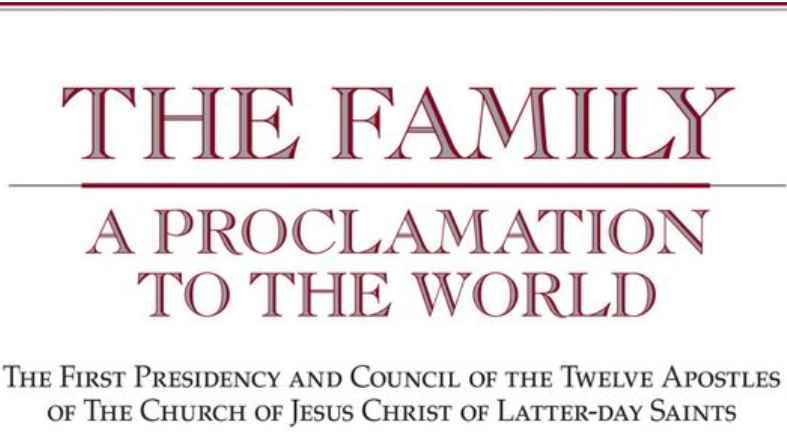A Retro Perspective on the Proclamation
I was sitting in the General Relief Society meeting in 1995 when President Gordon B. Hinckley presented “The Family: A Proclamation to the World.” It was remarkable in several ways, including the fact that an important declaration to the Church and the world was introduced in a meeting with the women of the Church. That felt unprecedented and significant.
The phrase “fathers and mothers are obligated to help one another as equal partners” shattered the teachings of the YW leaders and other teachers of my youth. I had been taught, in various ways, that women were to obey their husbands. I was told that a marriage is like a presidency, with the husband as president and the wife as a counselor. She could offer insight, but he made the final decisions, which she should support. This, I was taught, was the meaning of “preside.” If there is conflict, the man has the final say, because he holds the priesthood. This system, demeaning to both men and women, was presented to me as the order of heaven.
When I heard “equal partners” in that meeting over 25 years ago, it came as a revelation of a different order in heaven. Heavenly Father was not the boss of Heavenly Mother—they are equal partners. What I was taught as a young woman was not a celestial law. This section of the Proclamation enlightened my understanding, taught me about my importance in God’s eyes, and changed our family dynamic for the better. At that moment in time, the shift was monumental.
When the Proclamation was presented to the Church, I had 5 daughters ranging in age from 2 to 12. I was in the throes of trying to manage their physical and emotional needs, along with a hefty sense of my responsibility to teach the gospel of Jesus Christ. It was hard to know where to focus my energies and efforts (beyond keeping everyone alive and reasonably well-kempt). The Proclamation helped with that, as well. At a time when I welcomed check lists to help me with my overwhelming responsibilities, I heard “[s]uccessful marriages and families are established and maintained on principles of faith, prayer, repentance, forgiveness, respect, love, compassion, work, and wholesome recreational activities.” Here was a laser focus on what mattered most! That list guided me in ordering my efforts. Honestly, including “wholesome recreational activities” was something I needed to hear when I was concerned about all the good works we ought to be doing. It was a necessary balance for this anxious young mom.
In 1995, the Proclamation came as a welcome support to our family. It corrected false doctrine about the relationship between husband and wife. It helped to direct our bests efforts to principles and activities that would invite the Spirit into our home and our individual lives. Those two key takeaways blessed me as a wife and mother for years.
That is why I am heart-broken over the way our appreciation of the Proclamation has devolved into a way to disparage families that don’t look like mine. I’ve been in numerous worship meetings, and Sunday School and Relief Society discussions, where the focus has been on opposing same-sex marriage, not on improving our own marriages and families. When we focus on how others are falling short, rather than how we can improve, we are victims of a shell game that distracts us from shaping our own families in the image of heaven. It is a tragic loss. Weaponizing the Proclamation as a mere defense against same-sex marriage diminishes our own potential to become more godly.
I hope we can return to an inward focus with the Proclamation. How can our own families improve by learning from its principles? How can we strengthen our faith, respect, and compassion? May our future discussions about the Proclamation shift focus to changing ourselves rather than condemning others.

